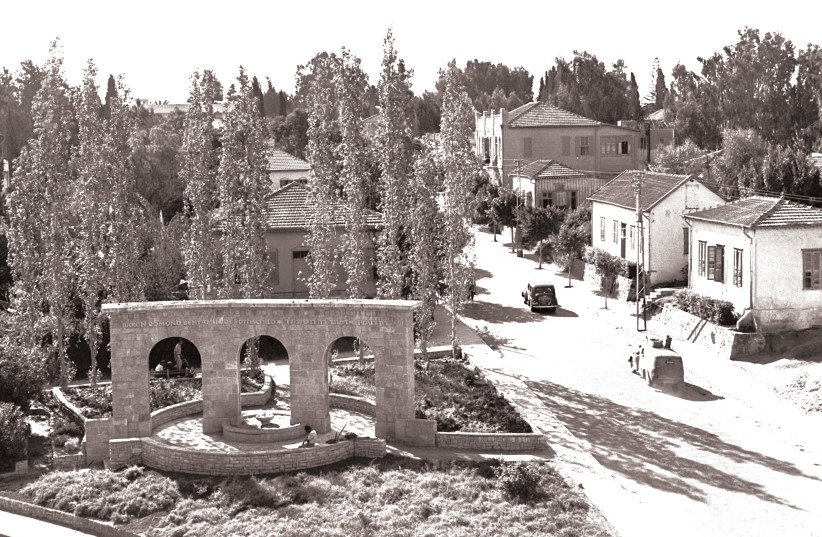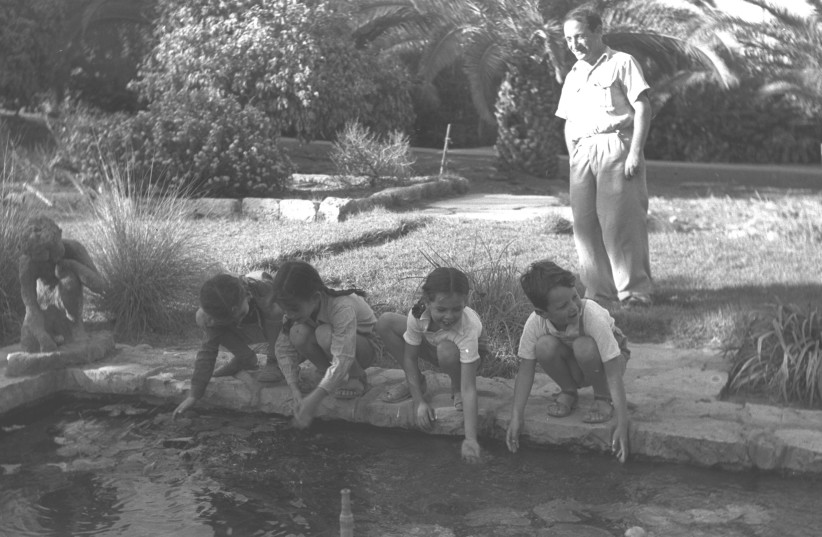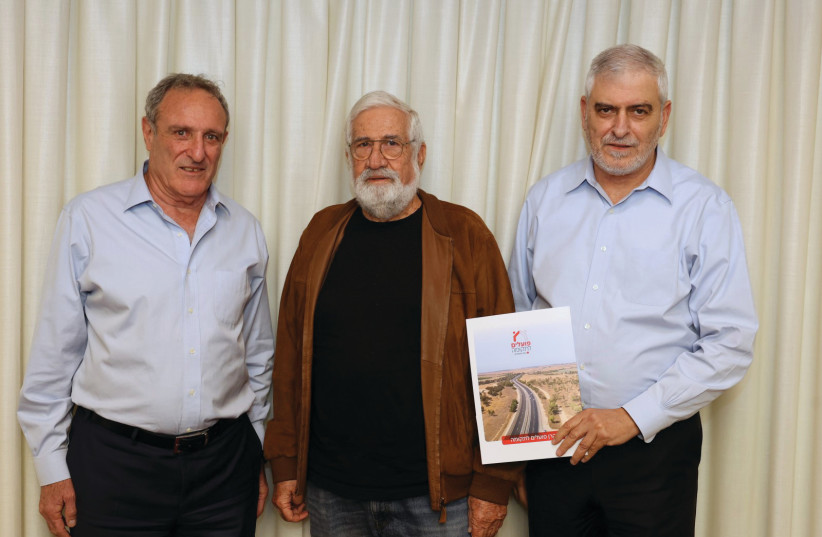While the Knesset celebrates its 75th anniversary on Tu Bishvat, it is now just over 13.5 years since the law for the establishment of a Knesset Museum was passed, and the museum is nowhere near completion, even though its actual building is already standing.
The museum is designated to be established on the site of the original Knesset building on the capital’s King George Avenue. The building housed the Knesset from 1950 to 1966, when the legislative body moved into its current premises, which were somewhat smaller than they are now and, like so many major buildings in Israel, were built with a significant infusion of Rothschild money.
It was hoped to have the museum ready in time for the 50th anniversary of the permanent Knesset building, but the 50th anniversary came and went, and the way things are going, so will the 60th.
When asked some years back to explain the reason for the delay, the museum’s director, Moshe Fuksman-Sha’al, said that it was an old building and all the plumbing was faulty and had to be replaced.
Fair enough, but how long should that take, given that much taller towers have been established all over Jerusalem in the interim? Perhaps it’s much easier to put up a large new building from scratch than it is to repair the flaws in an old one.

Meanwhile, anyone interested in Knesset history or legislation passed by the Knesset can access the Knesset Museum’s website and Facebook accounts, which recently featured interviews with Kadish Luz, the first speaker of the Knesset, and with Shimon Peres, the longest-serving member of Knesset, former prime minister, and former president of the State, not to mention former defense minister and former foreign minister plus a string of other portfolios.
Rothschilds funding new project
Even now, the Rothschilds have again come to the rescue to finance a project which, strictly speaking, should be the duty of the government. Together with the National Union of Israeli Students, the Edmond de Rothschild Foundation is funding a NIS 9.5 million project that involves the establishment of 15 resilience centers in academic institutions throughout Israel.
This follows the foundation’s establishment of a NIS 20m. emergency fund for immediate psychological care to help communities cope with psychological and emotional tensions resulting from the October 7 massacre and abductions. The resilience centers stretch from Sapir Academic College in the South to Tel Hai in the North.
Miki Kliger, deputy chairman of the executive council of the foundation, says that this new fund will also be of benefit to university students returning to their studies, particularly soldiers in the reserve forces and those students injured by Hamas at the Supernova music festival.
Eli Buch, the CEO of the foundation’s philanthropic division, emphasized that the fund will also provide financial aid to other academic institutions that hope to establish resilience centers, to be mentored by mental health professionals, and to be administered by students and faculty members.
Shay Shidlov, CEO of the National Union of Israeli Students, emphasizes that the Hamas massacre impacted heavily on the young generation, which participated in the Supernova music festival, as well as all those living in the Gaza border area, or those who were or are serving there in the front lines of the army.
Herzog lights up home
In addition to putting out a call to the world at large to demand the immediate release of the hostages being held in Gaza on the 100th day of their captivity, President Isaac Herzog ordered that the President’s Residence in Jerusalem be bathed in yellow light as a sign to the whole world to be aware, and to join with Israel in demanding that Hamas instantly cease this physical and psychological torment and immediately release all the women, men, the sick, the elderly, and the children they had by that day been holding for 100 days in the most brutal of conditions.
Diplomacy between Czech Republic and Israel
Israel and the Czech Republic are on the same page on many issues, including diplomacy. When Czech President Petr Pavel came to meet Herzog this week, he was accompanied by a large delegation, including Czech Ambassador Veronika Kuchynova Smigolova, who is the first Czech female ambassador to Israel.
In accordance with protocol, Anna Azari, who is Israel’s ambassador to the Czech Republic, was also present. In their conversation, Pavel and Herzog concurred that the top priority must be the return of the hostages from Gaza.
Refreshments customarily served to guests at intimate meetings at the President’s Residence include mini boxes of chocolates and dates filled with nuts. The chocolate boxes, in either navy blue or white, feature the presidential crest, and “Office of the President” printed in Hebrew, Arabic, and English.
Some of the members of the delegation pocketed the chocolates as souvenirs, and chose to eat the dates.
World Economic Forum this week
Only days after meeting with US Secretary of State Antony Blinken for the fifth time since October 7, Herzog will meet him again this week at the World Economic Forum in Davos, where wars – primarily those in Ukraine and Gaza – will be the main focus of discussions.
A number of leaders of Arab countries – among them those from Qatar and the United Arab Emirates – have indicated their attendance, and Ukraine’s President Volodymyr Zelensky will also be there. Blinken will be accompanied by National Security Advisor Jake Sullivan and other senior American figures.
Also traveling to Switzerland from the US, albeit not representing the US, will be UN Secretary-General Antonio Guterres. At least 40 foreign ministers will also be there.
From an economic standpoint, war affects countries both positively and negatively. Countries with munitions for sale see an uptick in their economies, but other countries, whose exports are negatively affected by war, may experience sharp declines in their economies. This could happen if the Houthis keep attacking cargo ships.
For Herzog, who has valiantly been spelling out Israel’s message to the world, particularly since the convening of the International Court of Justice, Davos is a most important destination, in that his presence there enables him to put the case for Israel face-to-face to a much more influential audience.
Solidarity with Israel expressed by Poland's new FM
Both Israel and Poland have new foreign ministers, who have already introduced themselves to each other – albeit on the phone. Poland’s Radosław Sikorski and Israel’s Israel Katz discussed ministerial consultations, bilateral issues, which they agreed should be strengthened, growing tensions and hostilities in the Middle East, and Russia’s assault on Ukraine.
With regard to the Middle East, Sikorski expressed his country’s unwavering solidarity with Israel in the wake of Hamas’s attacks. At the same time, he stressed Israel’s obligation to keep the military response moderate. In addition to discussing Operation Swords of Iron, the ministers addressed the continuing instability in southern Lebanon and in the Red Sea, and the possible repercussions of both situations.
On the subject of Ukraine’s defensive war, Sikorski noted that it is essential to provide Ukraine with extended international support. Poland is one of several European countries that are wary of Russian hegemony.
Katz expressed deep appreciation for Poland’s solidarity with Israel, while Sikorski reaffirmed Poland’s support for Israel’s right to self-defense.
Meanwhile, Israel is still waiting for Poland to make good on its declaration in March of 2023 that it would reinstate its ambassador. In August 2021, Poland and Israel each recalled their ambassadors on issues related to Holocaust history and Jewish property claims.
New legislation in Poland at that time placed severe restrictions on claims for Jewish-owned properties that had been confiscated first by the Nazis and later by the Communists. In July 2022, Israel reinstated its ambassador to Poland, and Yacov Livne, who succeeded Alexander Ben Zvi, who was transferred to Russia, submitted his credentials to Polish President Andrzej Duda.
Life is not always easy for an ambassador, and in Ben Zvi’s case, even though Israel has been careful not to offend Russia, it must be particularly difficult, as he was born in Ukraine.
In the ongoing absence of an ambassador, the Polish Embassy in Israel continues to be headed by chargée d’affaires Agata Czaplinska.
US Ambassador volunteers for Chabad organization
Like many other diplomats serving in Israel, US Ambassador Jack Lew has joined in social welfare endeavors to aid the poor and the evacuated. This week he joined other volunteers at Pantry Packers in Jerusalem, and tweeted afterward that it was a privilege to serve alongside Pantry Packers volunteers and to see their dedication. “Service is the spirit of MLK [Martin Luther King Jr.] Day and at the root of our shared values with Israel,” he wrote.
Pantry Packers, established by Chabad, delivers food and household maintenance supplies to needy families and senior citizens every week.
Chabad centers all over the country have been conducting a variety of volunteer services on behalf of evacuees, soldiers, senior citizens, and families facing economic hardship. In Jerusalem, two Chabad centers within five minutes’ walk of each other, separately celebrated the 100th birthday of journalist Walter Bingham.
Chabad of Talbiyeh was first, and last Shabbat it was the turn of Chabad of Rehavia, whose members cheered Bingham and lustily sang “Siman Tov U’Mazal Tov” as he entered the prayer hall.
For Rabbi Yisroel Goldberg, the director of Chabad of Rehavia, this was a special occasion, not only because Bingham is a popular member of his congregation, but because Goldberg’s brother was out of Gaza, where he had been for almost three months.
Earlier in the month, Goldberg was in his native Canada visiting his mother, who was recuperating from surgery, when his brother, who had been released from Gaza two days earlier, suddenly showed up. It was a delightful surprise for their mother and the best medicine she could possibly receive.
Last weekend was also the 40th anniversary of the death of the great kabbalist Israel Abuhatzeira, known as the Baba Sali, who was in close contact with Rabbi Menachem Mendel Schneerson, the last Lubavitcher rebbe in the Chabad dynasty.
This coming Shabbat, which marks the 74th anniversary of the death of the rebbe’s father-in-law and immediate predecessor, Rabbi Yosef Yitzhak Schneersohn, will be special for Chabad communities around the world.
Ambassadors' Club of Israel honors Israeli women for bravery
This month, the Ambassadors’ Club of Israel celebrates its 13th anniversary, or, in the words of its founder, and president, Yitzhak Eldan, “this is the year of the ACI’s bar mitzvah.”
Within the framework of its activities, the ACI holds welcome luncheons or dinners for new ambassadors, as well as several events during the year to honor not only ambassadors but also honorary consuls.
It also arranges for diplomats to visit historic sites, places that are in the news, operas, music festivals and concerts, as well as institutions and business enterprises that will be beneficial to their work in promoting bilateral relations.
Sometimes, the honoree is not exactly new in Israel, as is the case with Vietnamese Ambassador Ly Duc Trung, who presented his credentials to Herzog a year and a half ago. The ACI will hold a business luncheon in his honor next week, and guests will include potential Israeli investors in Vietnam.
In recent years, Israel has increasingly established diplomatic relations with Asian countries, and now has diplomatic ties with more than a dozen countries in Asia, a factor that contributes greatly to Israel’s economy.
An annual activity of the ACI is to honor outstanding women, including female ambassadors on International Women’s Day in March. This year the focus will be on Israeli bravery, and the adjudicating committee is currently in the process of reviewing candidates for the Woman of Valor Award. There are so many deserving women that it will be difficult to decide on who is the most deserving of all.
Kibbutznik refugees awaiting return to rural life
Although Israelis of many backgrounds fight shoulder to shoulder, essentially ignoring, religious, political, and ethnic differences, in peacetime many find it difficult to get along or to adapt to an unfamiliar environment. For instance, many of the evacuated kibbutzniks cannot tolerate an urban way of life, and can’t wait to get back to their own kibbutz or someone else’s.
Evacuees from northern communities who have been sent to Jerusalem or Tel Aviv hate both cities, even though by their own admission they have been treated right royally in both, and have experienced the warmest and most generous hospitality. But home is where the heart is, and home is where most of the evacuees want to be.
In most cases, those evacuated from kibbutzim attacked by Hamas, no longer have homes to which they can return. They hate living in hotels, and are not enthusiastic about moving into urban apartments. Most of all, they don’t want to be separated. Wherever they go while waiting for their kibbutzim to be rehabilitated, they want to be together.
The members of Kibbutz Nahal Oz on the Gaza border have moved north, as a community within a community, and are being hosted for as long as is necessary by Kibbutz Mishmar Ha’emek, with which they have a shared political ideology but somewhat different lifestyles.

Though sharing space and beliefs, the approximately 400 members of Nahal Oz will maintain their independence.
This is not the first time that Nahal Oz members have moved temporarily to Mishmar Ha’emek when hostilities made it dangerous for them to remain in the South. It was therefore natural for them to yet again find a temporary home in Mishmar Ha’emek, said Mishmar Ha’emek’s secretary-general, Michal Shamai.
Members of Kibbutz Be’eri will be moving to Kibbutz Hatzerim, near Beersheba, and members of other kibbutzim have also adopted kibbutz evacuees from elsewhere.
New Bank Hapoalim fund for border communities
Apropos the evacuated Gaza border communities, Bank Hapoalim has launched a NIS 100m. fund toward the rehabilitation, development, and resilience of communities in the western Negev which have suffered damage and destruction by Hamas.

The fund will enable businesses to thrive, will make jobs available for hundreds of people, and will contribute to the security of thousands of residents.
The fund is administered by a public committee headed by retired IDF general Amram Mitzna, a former mayor of Haifa and former chairman of the Labor Party, along with other well-known figures, including academic educator Prof. Yifat Bitton and venture capitalist and former director-general of the Finance Ministry Keren Terner-Eyal, who, together with senior officers of the bank, will decide on projects to which funding will be contributed, with priority going to those communities that were victims of the Hamas onslaught on October 7.
Reuven Krupik, the bank’s chairman of the board, who will have observer status on the committee, said that the establishment of the fund was within the framework of Bank Hapoalim’s long-standing social responsibility and its commitment to strengthening communities within the state.
Former diplomat publishes his fourth book
At age 94, former diplomat Zalman Shoval is still busy writing opinion pieces – mainly on foreign policy and security issues – for newspapers and magazines in both Hebrew and English. He is a banker, former member of Knesset, real estate developer, social activist; sits on the boards of numerous committees; and has twice served as ambassador to the United States. And that’s only a short list.
Shoval recently published his fourth book, In My Opinion, an anthology of his essays from 1991 to 2016. Most take up less than a page, and so can be selected at random, and make for easy reading. In addition to featuring political and security analyses, they also present a fascinating perspective of contemporary history. The book is in Hebrew.
greerfc@gmail.com
